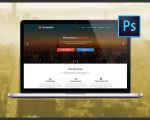
Why Web Design Matters for Digital Marketing Agencies
As a digital marketing agency, your website is not just an online presence—it's a powerful tool to showcase your services, attract potential clients, and convert visitors into leads. A well-designed website reflects your agency's values, expertise, and professionalism, making it essential to stand out in a competitive industry. But how do you design a website that effectively meets these goals? Let me walk you through the process.
1. The Role of User Experience (UX) in Web Design
When designing a website for a digital marketing agency, the user experience (UX) should be your top priority. A good UX means visitors will find it easy to navigate your site, which directly influences how long they stay on your site and whether they take action. In fact, research shows that 88% of online consumers are less likely to return to a site after a bad user experience. This can negatively affect your agency's conversion rates.
One way to enhance UX is by focusing on intuitive navigation. Make sure your site has clear and accessible menus that allow users to find what they need without frustration. For instance, your homepage should immediately communicate what your agency does and how visitors can get in touch with you. No one wants to scroll endlessly or click through multiple pages just to find your contact info. Ensure that your call-to-action buttons are easy to find and strategically placed throughout your site.
2. How Responsive Web Design Improves Engagement
With the increasing use of mobile devices, responsive design has become essential. A responsive website adjusts its layout depending on the device being used, ensuring your visitors have a seamless experience whether they’re on a smartphone, tablet, or desktop. In fact, mobile-first indexing is now a priority for Google, which means your site’s mobile version is more important than ever for SEO purposes.
By optimizing your website for all devices, you ensure that visitors can access your site from anywhere. Imagine potential clients visiting your site from their mobile phones while on the go. If your site isn’t responsive, they’ll likely leave in frustration, possibly turning to a competitor with a more mobile-friendly design. For digital marketing agencies, this could mean the difference between landing a new client or losing them to the competition.
3. SEO-Optimized Web Design for Higher Visibility
As an agency, your website needs to be optimized for search engines. Search engine optimization (SEO) is the backbone of any successful digital marketing campaign, and web design plays a crucial role in it. Factors like site speed, mobile responsiveness, and the proper use of meta tags can all impact your SEO rankings. For example, a website with slow loading times will likely rank lower on Google, which means fewer people will find your agency when searching for digital marketing services.
Integrating SEO-friendly web design elements can drastically improve your online visibility. Start by optimizing your content for the keywords your target audience is searching for. Ensure your page titles, headers, and image alt texts are all keyword-rich. Additionally, make sure your site is structured in a way that search engines can easily crawl it. Tools like Google Search Console can help you identify areas for improvement in terms of SEO.
4. Visual Design: Creating a Memorable Brand Identity
In the digital world, your website is often the first impression potential clients will have of your agency. Your visual design plays a major role in conveying your brand identity and building trust with visitors. Think about your color scheme, typography, and imagery—these elements should reflect your agency's personality and resonate with your target audience. For example, a modern and clean design may appeal to startups and tech companies, while a more traditional design might attract established businesses in need of reliable, professional services.
Branding consistency across all pages is key. Your logo, brand colors, and fonts should be used consistently to create a cohesive experience that aligns with your agency’s values. A well-designed website reinforces trust and credibility, making it more likely that visitors will convert into clients.
5. Adding Interactive Elements to Engage Visitors
To keep your visitors engaged and encourage them to explore your services further, consider incorporating interactive elements into your website. Features like chatbots, quizzes, and interactive case studies can enhance user engagement and provide valuable insights into your visitors' preferences. For example, a chatbot can answer basic questions or direct visitors to the right pages, ensuring a seamless and personalized experience.
Quizzes or surveys can also be great tools to collect information about your visitors while providing them with valuable insights into their needs. These interactive features create a dynamic experience that goes beyond just static content, which can keep users on your site longer and increase the chances of conversion.
6. Case Studies and Portfolio: Showcasing Your Success Stories
As a digital marketing agency, one of the best ways to demonstrate your expertise is by showcasing real-life case studies and success stories. When visitors see that you've successfully helped other businesses achieve their goals, they are more likely to trust you with their own projects. Your case studies should highlight your agency’s ability to deliver results—whether it's increasing traffic, improving SEO rankings, or growing revenue for your clients.
Additionally, having a well-curated portfolio with detailed descriptions of your projects allows potential clients to see the breadth of your work. This not only boosts credibility but also allows visitors to visualize how you can help them achieve their goals.
7. Speed and Performance: Crucial for Retaining Visitors
Website speed is another critical factor for keeping visitors on your site. According to Google, a delay of just one second in page load time can result in a 7% reduction in conversions. If your website is slow, visitors are more likely to leave before they even see what you have to offer. Optimizing images, using caching, and minimizing unnecessary code are just a few ways to improve site speed and performance.
Keep in mind that users expect fast-loading websites, and search engines like Google reward websites that provide a smooth and fast user experience. With these improvements, you'll not only keep visitors on your site longer but also improve your chances of ranking higher in search results.
8. Regular Updates and Maintenance
Once your website is live, it’s important to regularly update and maintain it. This includes updating content, adding new case studies, checking for broken links, and ensuring all technical aspects of the site are working properly. A well-maintained website gives visitors the impression that your agency is active and professional. It also ensures that your site continues to perform well in terms of SEO and user experience.
Regular updates also provide an opportunity to implement new design trends, keeping your website fresh and engaging. This way, your site continues to be a powerful tool for attracting and converting new clients.








